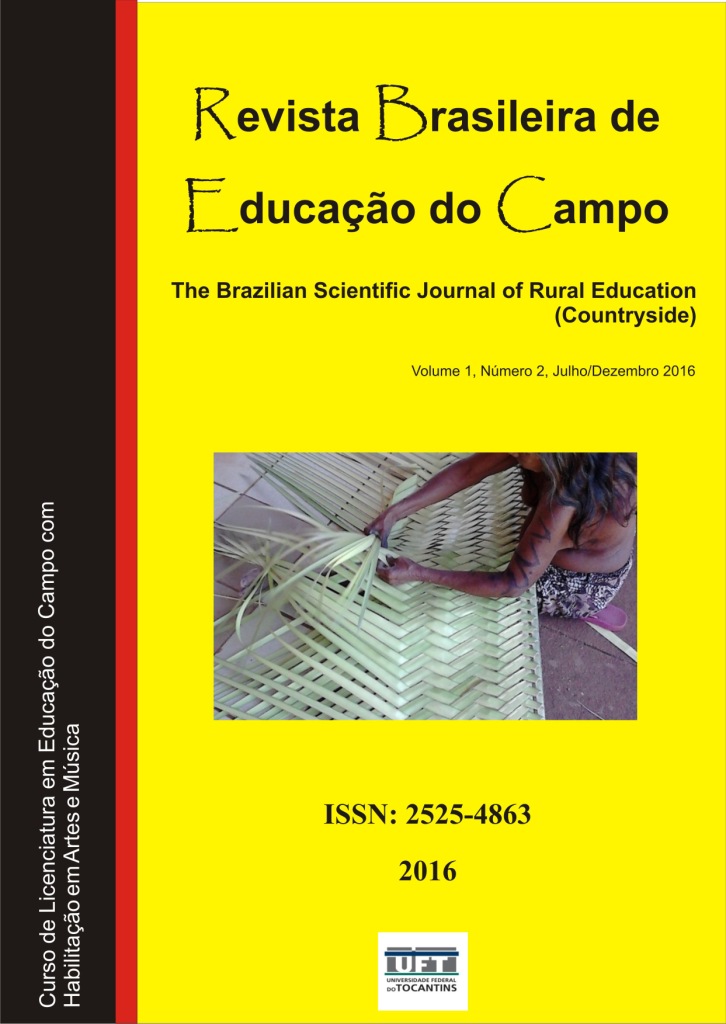Understanding the social movements countryside and MST: educational project
DOI :
https://doi.org/10.20873/uft.2525-4863.2016v1n2p524Mots-clés :
Educação do Campo, Educação do campo, Emancipação, Paulo Freire, MSTRésumé
ABSTRACT. This article is the final text of the summary of the master's degree result of research conducted at the School of Paulo Freire settlement Antonio Conselheiro in the municipality of Barra do Bugres-MT, locus of this study ethnographic case. The aim of this study was to understand and discuss the education and practices in the field as a possibility of causing emancipation of their subjects through educational practice through the school's educational project. The research approach aims to fundamentally understand, interpret and narrate the emancipation as a viable-original in the rural education project. This research is a qualitative approach of phenomenological nature. In the light of Freire's thought, I realized that the settlers to be guided by the understanding of the history assuming the perspective of the novel - which consists viable in the dialectics of Pedagogy in moving the school keeps alive the thought of Freire in daily activities. In this regard I noted that the MST qualifies Freire's thought to contemporary the struggle of the resistance of the oppressed in many gears that the school promotes. This research entails contribution as a resistance struggle to sharing by this theme and the teachers and students of Paulo Freire school.
Téléchargements
Références
Arroyo, M. G. (2004). Apresentação. In Caldart, R. S. Pedagogia do Movimento Sem-Terra: escola é mais do que escola. (pp. 5-15). Petrópolis: Vozes.
Bonamigo, C. A. (2000). Pra mim foi uma escola: o princípio educativo do trabalho cooperativo. Passo Fundo: UPF.
Caldart, R. S. (2003). A escola do campo em movimento In Arroyo, M. G., Caldart, R., & Molina, C. M. (Org.). Por uma educação do campo. (pp. 20-35). Petrópolis: Vozes.
Caldart, R. S. (2000). Pedagogia do Movimento Sem-Terra: escola é mais do que escola. Petrópolis: Vozes.
Caldart, R. S. (1997). O MST e a educação. In Stédile, J. P. A reforma Agrária e a luta do MST. (p. 223-242). Petrópolis, RJ: Vozes.
Evers, T. (1989). A face oculta dos novos movimentos sociais. Novos Estudos CEBRAP, (4), 11-23.
Fernandes, B. M. (2000). A formação do MST no Brasil. Petrópolis, RJ: Vozes.
Figueira, S. (1985). O “Moderno” e o “Arcaico” na Nova Família Brasileira: notas sobre a dimensão invisível da mudança social. In Figueira, S. (Org.). Uma Nova Família? O moderno e o arcaico na família de classe média brasileira. (p.11-29). Rio de Janeiro: Jorge Zahar.
Freire, P. (2002). Educação como prática de liberdade. RJ: Paz e Terra.
Freire, P. (2005). Pedagogia do oprimido. RJ: Paz e Terra.
Freire, P. (2002). Pedagogia da autonomia: saberes necessários à prática educativa. RJ: Paz e Terra.
Garcia, R. L. (2000). Movimentos Sociais – escola – valores. In Garcia, R. L. (Org.). Aprendendo com os Movimentos Sociais. Rio de Janeiro: DP&A.
Scherer-Warren, I. (1987). Cidadania sem fronteiras: ações coletivas na era da globalização. São Paulo: Hucitec.
Gohn, M. G. M. (1999). Movimentos sociais e educação. SP: Cortez.
Melo Neto, J. F. (2004). Educação Popular: enunciados teóricos. JP: Universitária/UFPB.
Souza, M. A. (1999). As formas organizacionais de produção em assentamentos rurais do Movimento dos Trabalhadores Rurais Sem Terra – MST. (Tese de Doutorado) Universidade Estadual de Campinas.
MST. Documento Básico.1997
Touraine, A. (1983). Palavra e sangue. Campinas: UNICAMP.
Thompson, E. P. (1981) Miséria da teoria. São Paulo: Zahar.
Normais gerais do MST. (1989). SP: São Paulo.
Téléchargements
Publié-e
Comment citer
Numéro
Rubrique
Licence
Proposal for Copyright Notice Creative Commons
1. Policy Proposal to Open Access Journals
Authors who publish with this journal agree to the following terms:
A. Authors retain copyright and grant the journal right of first publication with the work simultaneously licensed under the Creative Commons Attribution License that allows sharing the work with recognition of its initial publication in this journal.
B. Authors are able to take on additional contracts separately, non-exclusive distribution of the version of the paper published in this journal (ex .: publish in institutional repository or as a book), with an acknowledgment of its initial publication in this journal.
C. Authors are permitted and encouraged to post their work online (eg .: in institutional repositories or on their website) at any point before or during the editorial process, as it can lead to productive exchanges, as well as increase the impact and the citation of published work (See the Effect of Open Access).














